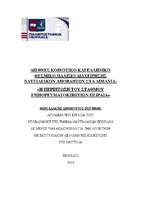| dc.contributor.advisor | Σαμιώτης, Γεώργιος | |
| dc.contributor.author | Θωμαδάκης, Δημήτριος | |
| dc.date.accessioned | 2016-03-10T07:49:54Z | |
| dc.date.available | 2016-03-10T07:49:54Z | |
| dc.date.issued | 2014 | |
| dc.identifier.uri | https://dione.lib.unipi.gr/xmlui/handle/unipi/8599 | |
| dc.description.abstract | Το ζήτημα της διαχείρησης των ναυτιλιακών αποβλήτων είναι ένα από τα κυριότερα θέματα διαβούλευσης στην παγκόσμια ναυτιλιακή κοινότητα.Με την παρούσα ερευνητική προσπάθεια θα προσπαθήσουμε να συνδέσουμε τα αποτελέσματα της Ευρωπαϊκής οδηγίας 2000/59 για την παράδοση και παραλαβή των ναυτιλιακών αποβλήτων με την εξέλιξη της ναυτιλικής αγοράς και λιμενικής βιομηχανίας.Θα προσπαθήσουμε να αποδείξουμε πόσο σημαντικό είναι ο χρονικός περιορισμός της υφιστάμενης διαδικασίας πάντα σε συνδυασμό με την όλο και αυξανόμενη τάση σεβασμού προς το περιβάλλον αλλά και την τεχνολογική μεταβολή που ωθεί σε γιγαντοποίηση των πλοίων και στη αύξηση των ναυτιλιακών αποβλήτων.Τέλος θα παραθέσουμε την διαδικασία που ακολουθείται στο σταθμό εμπορευματοκιβωτίων Πειραιά καθώς και τις καταδικαστικές αποφάσεις του Ευρωπαϊκού Δικαστηρίου κατά τη Ελληνικής Δημοκρατίας για τη μή τήρηση των κανονισμών για την παράδοση και παραλαβή των ναυτιλικών αποβλήτων. | el |
| dc.format.extent | 112 | el |
| dc.language.iso | el | el |
| dc.publisher | Πανεπιστήμιο Πειραιώς | el |
| dc.rights | Attribution-NonCommercial-NoDerivatives 4.0 Διεθνές | * |
| dc.rights.uri | http://creativecommons.org/licenses/by-nc-nd/4.0/ | * |
| dc.subject | Εμπορευματοκιβώτια | el |
| dc.title | Διεθνές κοινοτικό και ελληνικό θεσμικό πλαίσιο διαχείρησης ναυτιλιακών αποβλήτων στα λιμάνια : η περίπτωση του σταθμού εμπορευματοκιβωτίων Πειραιά | el |
| dc.type | Master Thesis | el |
| dc.contributor.department | Σχολή Ναυτιλίας και Βιομηχανίας. Τμήμα Ναυτιλιακών Σπουδών | el |
| dc.description.abstractEN | The issue of ship-generated waste and the operational residues of the merchandise vessels are the most common consultation issues within the shipping industry.With this paper we attempt to connect the results of the European Directive 2000/59 for residues disposal with the evolution of the shipping and port industry.We emphasize the effort undertaken to minimize the fore-mentioned procedure and always under the scope of the growing concern for cleaner seas and ships,despite the enlargement of the vessels as a result of adopting on going technological changes. Last but not least we quote the procedure used at the Piraeus Container Terminal operated by PCT (Cosco Group) as well as the convictions of the Greek Authority for non compliance with the international,European and Greek law for the delivery of ship generated waste and residues. | el |
| dc.contributor.master | Ναυτιλία | el |
| dc.subject.keyword | Τεχνολογική πρόοδος | el |
| dc.subject.keyword | Ευρωπαϊκή οδηγία 200/59 | el |
| dc.subject.keyword | Ναυτιλιακά απόβλητα | el |
| dc.subject.keyword | Γιγαντοποίηση πλοίων | el |
| dc.subject.keyword | European directive 2000/59 | el |
| dc.subject.keyword | Ship generated waste | el |
| dc.subject.keyword | Residues | el |
| dc.subject.keyword | European law | el |



